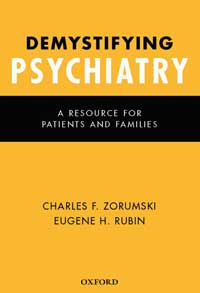Oxford University Press (2009)
Between them, Charles F. Zorumski, M.D., the Samuel B. Guze Professor and head of the Department of Psychiatry, and Eugene H. Rubin, M.D., Ph.D., professor of psychiatry, have more than 50 years of experience treating psychiatric patients and trying to help patients’ families — and their own families — better understand what they do.
“The book actually comes from many conversations we’ve had with people in the community and individuals in our own families who not only misunderstand psychiatric illnesses but don’t understand who psychiatrists are and how they fit into health-care delivery,” Zorumski said about the book. “So part of the impetus behind writing the book was to emphasize those things in ways a lay audience would understand.”

The book is unlike popular books about psychiatric illness, which tend to focus on one person’s story or one particular illness or treatment. Rather, the book is a general look at the entire field of psychiatry — the illnesses, the treatments and trends.
“Demystifying Psychiatry” is not a textbook, however. It does not require a medical or scientific background to understand. It explains how psychiatry differs from other mental health professions, such as psychology and social work. The book also includes an extensive bibliography to refer lay readers to other books that help define the field.
It argues that psychiatry is widely misunderstood and that people think of psychiatrists as part physician, part confessor, part police officer and part shaman. Rubin says he and Zorumski attempt to explain how psychiatry is similar to many branches of medicine in that psychiatrists and psychiatric treatments help many patients get better, but cures are rare.
“Full cures are rare in much of medicine, including psychiatry,” Rubin says. “Medications can help but not as much as we’re sometimes led to believe. Treatments can allow the brain to work with environmental changes to help people feel better. But there is no ‘quick fix’ with something as complex as significant psychiatric illnesses.”
Just as there are no quick fixes for many medical illnesses.
“It doesn’t matter whether we’re talking about major depression — a very common psychiatric illness — or whether we’re talking about high blood pressure or diabetes,” Zorumski said. “Those illnesses are not cured, either. They’re managed over time. And that’s one of the things that we really want consumers, and those who have illnesses, to understand. The expectation that a pill or a form of treatment is going to cure you is really inappropriate, just as it is inappropriate with high blood pressure and the other common illnesses.”
One difference, they argue, is that although many patients are reluctant to come to any doctor, those with common medical illnesses tend to show up eventually when they have serious, physical symptoms that make it impossible for the patient to function.
But with psychiatric illness, patients often don’t recognize that anything is wrong, even when they are unable to function. Zorumski and Rubin hope the book helps those patients and their families learn what to look for, how to seek psychiatric care and what treatments might help.